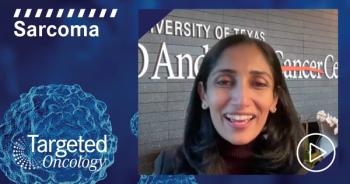
Researchers Explore Novel Treatment Strategies CNS Lymphoma

In an interview with Targeted Oncology, Craig Sauter, MD, discusses available treatments for patients with central nervous system lymphoma and research that will provide more developments moving forward in this space.
The standard-of-care treatment for patients with primary central nervous system (CNS) lymphoma continues to be methotrexate. However, researchers are investigating novel treatments with Bruton’s tyrosine kinase (BTK) inhibitors and chimeric antigen receptor (CAR) T cells to address unmet needs in this space.
According to Craig Sauter, MD, who spoke at the 4th Annual
The first-generation Bruton’s tyrosine kinase inhibitor ibrutinib (Imbruvica) has been of interest in treating patients with CNS lymphoma based on the disease’s reliance on chronic active B-cell receptor signaling.
BTK inhibitors have been primarily used and studied in the relapsed/refractory setting, Sauter said, but ongoing research is more interested in evaluating CAR-modified T cells for use in this patient population.
Furthering the development for more effective options in the relapsed/refractory setting is an area of unmet need.
In an interview with Targeted OncologyTM, Sauter, director, Blood and Marrow Transplant Program, Hematology and Medical Oncology, the Cleveland Clinic, discusses available treatments for patients with CNS lymphoma and research that will provide more developments moving forward in this space.
Targeted Oncology: What does the current treatment landscape look like for primary CNS lymphomas?
Sauter: Currently, the treatment landscape for primary CNS lymphomas is typically high-dose methotrexate-based induction. With remission achieved, there has been controversy and studies with consolidation, either nonmyeloablative chemotherapy, myeloablative chemotherapy followed by autologous transplantation, or whole brain radiotherapy. The treatment for relapsed or refractory disease is largely investigational.
How have the number and type of treatment options increased and improved over the past few years?
A lot of the studies have been focused on consolidation in first remission and what the role of the 3 options that I have previously stated are. [These are] particularly large, randomized, phase 3 studies, both at the cooperative group level and nationally, as well as internationally for relapsed or refractory disease. The focus has been on targeted inhibition and with the advent of CAR-modified T cells, the role that they may play in primary or secondary central nervous system lymphomas.
Can you discuss some of those available targeted therapies?
Given the cell of origin or the prominent cell of origin of primary central nervous system lymphoma being non-germinal center phenotype, Bruton tyrosine kinase inhibitors have been studied both alone as well as in combination with methotrexate. Lenalidomide [Revlimid]and next generation IMiDs, such as pomalidomide [Pomalyst], have also been studied. There has [also] been rationale around PI 3-kinase inhibitors, but obviously in the current landscape, that class of agents is somewhat prohibitive going forward.
How do treatment options differ between patients based on patient characteristics or factors?
For younger, fit patients, my preference would be intensive chemotherapy induction that contains high-dose methotrexate as a backbone, followed by consolidation with high-\
dose chemotherapy, followed by autologous stem cell transplantation with the intent of cure.
For older, more unfit patients, that landscape is much more open.
What ongoing research is generating excitement in this space?
We believe that in the space, particularly in the relapsed/refractory space, CAR-modified T cells need to be further investigated. Historically, the fear has been given a unique neurologic toxicity of that therapy, that may be prohibitive towards patients with both primary and secondary CNS lymphoma. Thankfully, there have been recent prospective investigations, albeit small, that have demonstrated, at least preliminarily, that it's safe. We're waiting for a readout on efficacy and further studies.
What are the key things to note moving forward when discussing CNS lymphomas?
The role of consolidation first permission will be a key takeaway based on recently reported, large, random assignment, phase 3 studies, particularly around autologous transplant against both whole brain radiotherapy as well as non-myeloablative chemotherapy. Then, some of the more preliminary data and prospective investigation for modified T cells in the relapsed/refractory setting [will be important to watch].



















